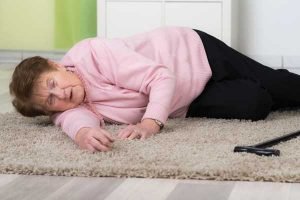
Falls Prevention
Falls Prevention

The risk of falls and associated complications rise steadily with age and can be a marker of increasing frailty. Frailty is not clearly defined but is widely accepted to include a combination of weight loss, fatigue, reduced grip strength, diminished physical activity or slowed gait associated with increased risk of falls, hospitalisation, loss of mobility and independence, increasing disability and death.(2)
The Australian Bureau of Statistics has found that the number of elderly people who die each year from falls has quadrupled over the past decade. 1530 people over the age of 75 died from falls in 2011, compared to 365 in 2002. Falls are also the leading cause of injury-related hospitalisation in persons aged 65 years and over in Australia. In 2011–12, 96,385 people aged 65 and over were hospitalised for a fall-related injury. The increasing rate of fall-related hospital admissions reflects Australia’s ageing population. The number of fall-related hospitalisations for older people has increased 2.3% per year between 1999–00 and 2010–11.
Physios have become increasingly aware of and concerned about the risk of falls and the hazardous long term effects on the older generation. Physios have seen the devastating effects falls can have on an individual and their loved ones. More often than not they result in serious injury, loss of confidence and reduced mobility. All of these can subsequently cause loss of independence and quality of life. For anyone dealing with falls or the risk of falling it can be frustrating and lead to feelings of helplessness and lack of self-esteem.
Physiotherapists can play a crucial role in the prevention of falls in older people. There is evidence that appropriately prescribed interventions can prevent falls. The strongest single predictor of future falls is a history of previous falls. This is probably because an individual’s reason for falling the first time is likely to recur. Assessment of physical functioning is the next strongest predictor.
Exercise programs for balance, strength & falls prevention
Exercise is a fall prevention intervention because impaired muscle strength and poor postural control are known to increase the risk of falling and are amendable to change with exercise. The programs involve exercises targeting gait, balance, functional tasks, strength, flexibility and endurance.
Evidence shows us that home-based exercise programs containing some form of balance and strength training are the most important intervention strategy to effectively decrease falls.
Strength and balance retraining is the most long-term, effective fall prevention measure that has cardiovascular, metabolic, and self-confidence benefits in addition to greater stability. Research has shown that falls can be prevented by retraining your balance and improving your muscular strength, endurance and flexibility.
Physiotherapy helps you maintain your vital independence with the implementation of individual, class and home exercise programs for balance, strength and falls prevention.
Our program consists of an individual assessment. Tailored exercise programs, such as those set out for you by a Physiotherapist, have been shown to be more effective than general programs at helping people regain good balance. Gentle strengthening, mobility and balance exercises with our Physiotherapists will help you maintain your independence and confidence.
It is never too late to start exercising, if you or a member of your family are concerned with your safety and balance, call our Duncraig Physio clinic and book an appointment now.
References
- World Health Organisation. WHO Global Report on Falls Prevention in Older Age. Geneva: World Health Organisation; 2007. http://www.who.int/ageing/publications/Falls_prevention7March.pdf?
- Fried LP, Tangen CM, Walston J, et al. Frailty in older adults: evidence for a phenotype. J Gerontol A Biol Sci Med Sci. 2001;56(3):M146-56.